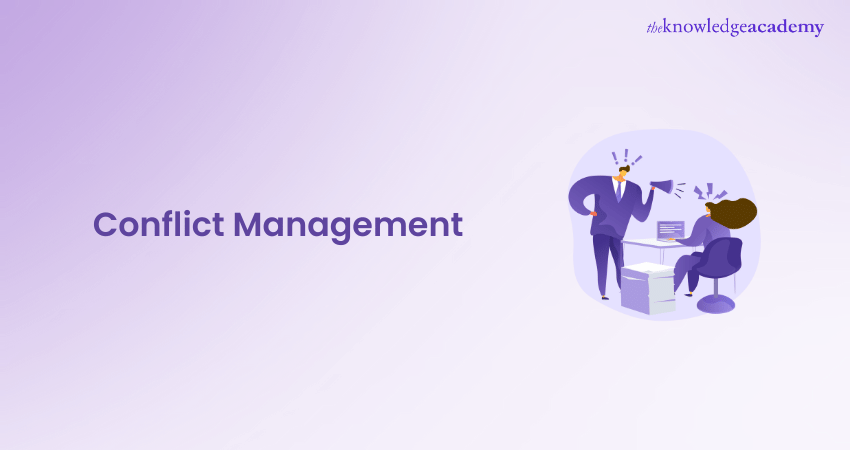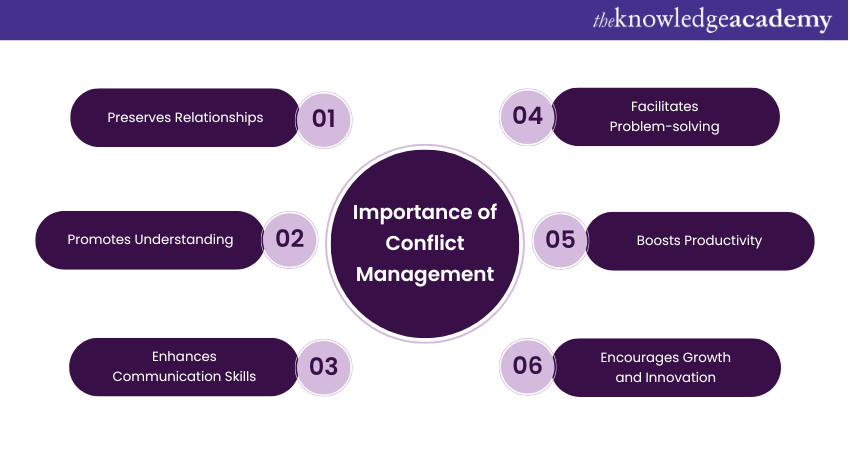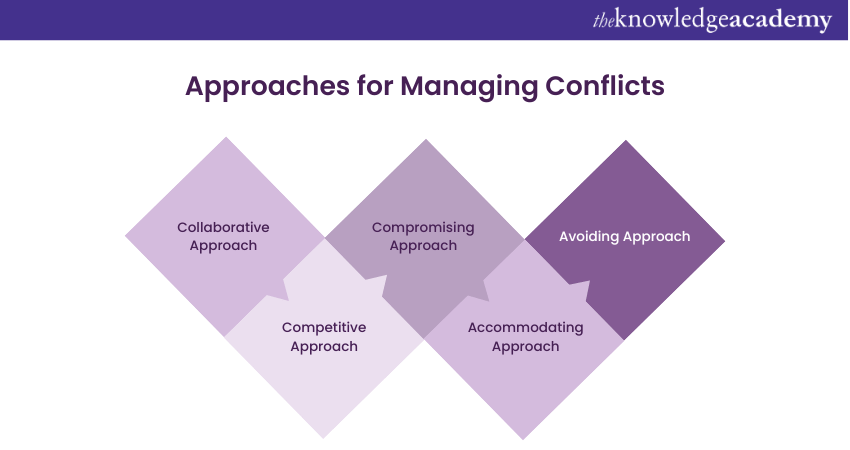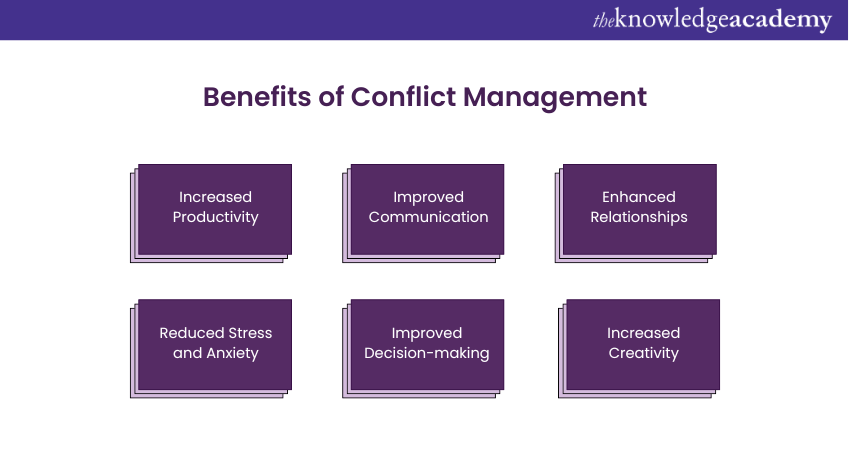We may not have the course you’re looking for. If you enquire or give us a call on + 1-866 272 8822 and speak to our training experts, we may still be able to help with your training requirements.
We ensure quality, budget-alignment, and timely delivery by our expert instructors.

Conflict is part of life. It can occur in our personal and professional lives. While conflict can be uncomfortable and sometimes even destructive, it presents an opportunity for growth and resolution. This is why understanding Conflict Management can help you constructively manage conflict.
Conflict management is an ability that can be acquired and improved, do you want to know? In this blog, you will learn what is Conflict Management, its importance, techniques and approaches, along with its benefits. Let's explore further to learn more!
Table of contents
1) What is Conflict Management?
2) The Importance of Conflict Management
3) Questions to Ask Before Choosing a Conflict Management Style
4) Techniques and approaches for managing Conflicts
5) Tips for Choosing a Conflict Management Style
6) Benefits of Conflict Management
7) Conflict Resolution Examples
8) Conclusion
What is Conflict Management?
Conflict management is the process of obtaining conflicts in a productive manner. It involves knowing the root cause of difficulties, communicating effectively, and developing fair and equitable solutions for everyone related.
In Conflict Management, the focus is not to win at the expense of others but to arrive at mutually beneficial outcomes. Collaborative problem-solving and Negotiation are critical skills in this process. It enables people to collaborate on creating agreements that meet the requirements and interests of all stakeholders.
Moreover, effective management involves several key components. First and foremost, it requires identifying the root causes and underlying issues that led to the conflict in the first place. Therefore, individuals can gain insight into the emotions, values, and interests at play. This deeper understanding also sets the stage for more meaningful and productive communication.

The importance of Conflict Management
The importance of Conflict Management cannot be stated. Conflicts are normal and essential components of interpersonal relationships. It occurs when individuals or organisations hold different points of view, interests, or requirements.
Without suitable management, these difficulties may get worse, resulting in damaged relationships, increased stress, and decreased efficiency. On the other hand, when conflicts are managed correctly, they can lead to beneficial outcomes and growth. Here are some major reasons why Conflict Management is important:

a) Preserves Relationships: Conflict Management helps preserve relationships by addressing conflicts constructively. It allows individuals to express their perspectives while also considering the views of others. By finding common ground and seeking win-win solutions, it prevents conflicts from causing long-term damage to relationships.
b) Promotes Understanding: It also fosters understanding between conflicting parties. It promotes open and honest communication, active listening skills, and empathy. Through effective dialogue, individuals can gain insights into each other's perspectives. They can gain a more profound comprehension of the root problems. This understanding forms the foundation for resolving conflicts and building stronger relationships.
c) Enhances Communication Skills: Conflict Management requires effective communication skills. It encourages people to communicate their thoughts and feelings easily and politely. Individuals can prevent misunderstandings and improve the overall quality of communication. Effective communication not only resolves conflicts but also strengthens relationships and promotes a positive work or home environment.
d) Facilitates Problem-solving: This concept is closely linked to problem-solving. It involves identifying the root causes of problems and finding mutually beneficial solutions. It enables opposing parties to collaborate to resolve challenges. This process not only resolves the immediate conflict but also builds problem-solving skills that can be applied in future situations.
e) Boosts Productivity: Unresolved conflicts can create tension, disrupt workflow and decrease motivation and engagement. Conflict Management addresses conflicts promptly, minimising their negative effects on productivity.
f) Encourages Growth and Innovation: When conflicts are properly managed, they become opportunities for learning and improvement. Conflicting ideas and perspectives can spark creativity and lead to innovative solutions.
Learn how to resolve conflict effectively and build stronger relationships with our Conflict Management Training.
Questions to Ask Before Choosing a Conflict Management Style
1) How much do you value the person or issue?
It may impact to choose one method over another based on how much you consider the person with whom you have an issue. It might not be beneficial to continue long-term dissatisfaction if you are concerned about ruining your connection. Finding an agreement may strengthen your relationship.
In addition, you may decide the significance of the conflict depending on how close to home the issue is. Sometimes, it’s an issue of ethics or personal principles, and you may need to continue the conflict. If the issue isn’t important to you, it may be better to let it go.
2) Do you understand the consequences?
You should be ready for the consequences of participating in the conflict. Maintaining an argument with a superior, especially in a professional environment, could have major consequences. However, if you understand the potential risks, you can determine whether to continue the conflict.
You may face consequences if you do not participate in the conflict. Maybe there will be both personal and ethical consequences for not sticking up for your ideas. Or, sometimes, poor judgement is taken and carried out because you did not consider an opposing perspective. Regardless, get a comprehensive picture of all the positive and adverse impacts before.
3) Do you have the necessary time and energy to contribute?
Entering a conflict with a solid perspective prepares you for what may be a long-term experience involving research, presentations, conversations, and anxiety. Before getting in, make sure there's enough time in the schedule to give attention to the conflict.
Additionally, and most importantly, make sure you care enough about the problem to spend the time and effort required to resolve it every day. Going through discussions with others over a topic that is not relevant to you can be exhausting.
Techniques and Approaches for Managing Conflicts
Conflict Management techniques and approaches are various methods used to address and resolve issues effectively. These approaches aim to find solutions that satisfy the needs and interests of everyone involved. Here are some commonly used Conflict Management Techniques and approaches:

a) Collaborative Approach: This strategy promotes open communication and active engagement by everyone involved. It focuses on developing solutions that are beneficial to everyone by taking into consideration the goals and needs of all parties concerned.
b) Competitive Approach: It involves asserting one's own interests without considering others. It often results in a win-lose situation, where one party gains at the expense of the other.
c) Compromising Approach: The compromising approach aims to find a middle ground by making concessions from both sides. It requires negotiation and finding mutually acceptable solutions. This approach may be suitable when time is limited or when both parties have equal power.
d) Accommodating Approach: This approach involves prioritising the needs of the other party over one's own. It emphasises maintaining relationships and avoiding conflicts. While accommodating can be beneficial in certain situations, it should not be used excessively to prevent exploitation.
e) Avoiding Approach: It entails ignoring or avoiding conflicts altogether. It may be useful when conflicts are insignificant or when emotions need time to settle. However, avoiding conflicts can lead to unresolved issues and escalate tensions in the long run.
Master the art of problem-solving and make better decisions with our Problem Solving Training – Sign up now!
Tips for choosing a Conflict Management style
The key to Conflict Management is to select the appropriate style for every scenario. When deciding which approach to Conflict Management to use, ask yourself the following questions:
1) How significant are your needs and wishes?
2) What happens if your needs and wants are not fulfilled?
3) How much do you consider the other person or people involved?
4) How much importance do you put on the issue?
5) Have you considered the effects of using different Conflict Management styles?
6) Do you have the time and energy to handle the matter right now?
The answers to these questions can help you decide which style to use in an instance based on what you've learned about the different conflict resolution methods.
Benefits of Conflict Management
From improved communications to building relationships there are many benefits to Conflict Management. Let’s look at some of them below:

a) Increased Productivity: When issues are managed effectively, it can lead to increased productivity. People are more likely to be focused and engaged when they are not stressed or anxious about a conflict.
b) Improved Communication: Conflict Management can also help to improve communication between people. It teaches people how to listen to each other's perspectives. They also learn to communicate their needs and wants clearly and respectfully.
c) Enhanced Relationships: When issues are managed effectively, it can help to enhance relationships between people. This is because people tend to understand each other better and build trust and respect.
d) Reduced Stress and Anxiety: It can also help to reduce stress and anxiety. This is because it teaches people how to deal with conflict in a constructive way rather than letting it escalate and cause them to feel stressed or anxious.
e) Improved Decision-making: Conflict Management can also help to improve decision-making. It teaches people how to gather information from different perspectives. It also helps them understand how to make fair and equitable decisions for everyone involved.
f) Increased Creativity: It can also help to increase creativity. It teaches people how to think outside the box and how to come up with new solutions to problems.
Conflict Management is an important skill that can have a number of benefits for individuals and organisations. If you are able to manage conflict effectively, you will be more likely to:
a) Achieve your personal and professional goals
b) Build strong relationships
c) Reduce stress and anxiety
Become a more effective leader and achieve professional goals with our Personal & Organisational Development Training – Sign up now!
Conflict Resolution Examples
Here are a few examples of how these conflict resolution strategies can be applied in real-world situations.
1) Accommodating an Angry Customer
A consumer contacts a retail store to complain about obtaining a damaged product. The customer service representative immediately apologises and acknowledges the problem. Understanding the importance of the situation, they provide a complete refund or exchange, as well as a discount on future orders.
The employee makes the customer feel valued and appreciated, focusing on their happiness to handle the issue peacefully and establish an excellent connection.
2) Avoiding a Trivial Argument
During a team meeting, there is a small dispute on the colour scheme for a project. Realising that the argument is silly and could develop unnecessarily, the team leader advises temporarily putting the subject on hold to focus on more urgent issues.
By avoiding unnecessary conflict over tiny matters, the team may stay focused on their objectives without wasting time and energy on trivial disagreements.
3) Compromising When Reaching an Impasse
Two business partners have hit an impasse in their negotiations over contract conditions. Recognising the necessity for compromise, they change their initial expectations to meet. Each side makes compromises to meet the other's interests, resulting in a beneficial agreement that enables the partnership to grow effectively.
4) Collaborate With Willing Customers
A software development company works closely with a group of willing clients to get feedback and suggestions to improve their product. The organisation involves clients in the creation procedure by holding regular meetings to include their ideas and answer their queries. By developing a collaborative connection, the organisation ensures that the outcome satisfies the needs and expectations of the target audience.
5) Competing for the Right Reasons
In a competitive sporting event, two participants compete for the championship trophy. While both are driven to win, they stick to the principles of fair play, respect, and sportsmanship throughout the competition. Their rivalry encourages them to push their boundaries and showcase their abilities.
However, they also demonstrate togetherness and mutual respect by acknowledging each other's achievements regardless of the outcome. Their healthy competition inspires young athletes and fosters a great sports culture.
Conclusion
We hope you read and understood everything about Conflict Management. Conflict is a part of life. It can manifest in any form, but it does not have to be destructive. By dealing with conflicts constructively, you can improve your relationships and achieve success.
Improve your management skills and become a more capable leader with our Management Courses – Sign up now!
Frequently Asked Questions

The five conflict resolution strategies are collaborative, competitive, compromising, accommodating and avoiding.

Conflict management is essential for resolving conflicts, avoiding escalation, and maintaining relationships. It encourages communication and mutually beneficial solutions, resulting in a peaceful and productive environment.

The Knowledge Academy takes global learning to new heights, offering over 30,000 online courses across 490+ locations in 220 countries. This expansive reach ensures accessibility and convenience for learners worldwide.
Alongside our diverse Online Course Catalogue, encompassing 17 major categories, we go the extra mile by providing a plethora of free educational Online Resources like News updates, Blogs, videos, webinars, and interview questions. Tailoring learning experiences further, professionals can maximise value with customisable Course Bundles of TKA.

The Knowledge Academy’s Knowledge Pass, a prepaid voucher, adds another layer of flexibility, allowing course bookings over a 12-month period. Join us on a journey where education knows no bounds.

The Knowledge Academy offers various Management Courses, including Introduction to Management, Conflict Management Training, Problem Solving Course, and Performance Management Training. These courses cater to different skill levels, providing comprehensive insights into Manage People.
Our Business Skills Blogs cover a range of topics related to Management, offering valuable resources, best practices, and industry insights. Whether you are a beginner or looking to advance your Management skills, The Knowledge Academy's diverse courses and informative blogs have you covered.
Upcoming Business Skills Resources Batches & Dates
Date
 Conflict Management Training
Conflict Management Training
Fri 17th Jan 2025
Fri 21st Feb 2025
Fri 4th Apr 2025
Fri 6th Jun 2025
Fri 29th Aug 2025
Fri 24th Oct 2025
Fri 26th Dec 2025







 Top Rated Course
Top Rated Course


 If you wish to make any changes to your course, please
If you wish to make any changes to your course, please


